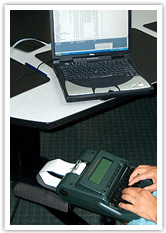 From time to time, the issue of professional ethics arises in the field of court reporting nationally and in Michigan. Over the years, we have seen situations that might appear unethical, or at least seem to be in a gray area. As Michigan court reporters, we love our profession and want it to thrive for many years to come. Abiding by standards of ethics allows us to protect the responsibility we have been given to be the keepers of the record and to stay neutral and impartial while carrying out our responsibilities.
From time to time, the issue of professional ethics arises in the field of court reporting nationally and in Michigan. Over the years, we have seen situations that might appear unethical, or at least seem to be in a gray area. As Michigan court reporters, we love our profession and want it to thrive for many years to come. Abiding by standards of ethics allows us to protect the responsibility we have been given to be the keepers of the record and to stay neutral and impartial while carrying out our responsibilities.
The National Court Reporters Association has devised a standard code of professional ethics that they ask reporters to agree to and abide by. This code is a good reference to consult in any situations that may involve potential ethical issues.
NCRA Code of Professional Ethics
A Member Shall:
- Be fair and impartial toward each participant in all aspects of reported proceedings, and always offer to provide comparable services to all parties in a proceeding.
- Be alert to situations that are conflicts of interest or that may give the appearance of a conflict of interest. If a conflict or a potential conflict arises, the Member shall disclose that conflict or potential conflict.
- Guard against not only the fact but the appearance of impropriety.
- Preserve the confidentiality and ensure the security of information, oral or written, entrusted to the Member by any of the parties in a proceeding.
- Be truthful and accurate when making public statements or when advertising the Member’s qualifications or the services provided.
- Refrain, as an official reporter, from freelance reporting activities that interfere with official duties and obligations.
- Determine fees independently, except when established by statute or court order, entering into no unlawful agreements with other reporters on the fees to any user.
- Refrain from giving, directly or indirectly, any gift or anything of value to attorneys or their staff, other clients or their staff, or any other persons or entities associated with any litigation, which exceeds $100 in the aggregate per recipient each year. Nothing offered in exchange for future work is permissible, regardless of its value. Pro bono services as defined by the NCRA Guidelines for Professional Practice or by applicable state and local laws, rules and regulations are permissible in any amount.
- Maintain the integrity of the reporting profession.
- Abide by the NCRA Constitution & Bylaws.
Not only is our professional code of ethics a guideline for court reporters, it is also a declaration of what attorneys and other members of the legal profession can expect from court reporters. We want our legal community to know we intend to abide by a high standard of ethical and professional behavior.
At O’Brien and Bails, our court reporters understand the code of ethics and strictly adhere to them. The standards above are guidance in all sorts of situations that arise in our field. We know that the integrity of our profession relies on our strict adherence to this code. We are also proud members of NCRA’s Ethics First program.
For more on court reporting ethics from our perspective, download this free report: “Thoughts on Court Reporter Ethics: From a Court Reporting Firm Owner”.
 I grew up in Detroit, and went through Detroit Public Schools when the schools were first rate. I had an older cousin growing up who went into the profession of court reporting and did very well. He always wanted me to go into the profession, and in 1975, after 18 months, my teacher at Macomb College, Mr. George Jackson, thought I was ready to work. And so I began working two days a week in Romeo District Court reporting arraignments. Being in front of a courtroom the size of a large bedroom with 50 suspected drinkers and drug offenders was one of those moments when you say to yourself “What am I doing here?”
I grew up in Detroit, and went through Detroit Public Schools when the schools were first rate. I had an older cousin growing up who went into the profession of court reporting and did very well. He always wanted me to go into the profession, and in 1975, after 18 months, my teacher at Macomb College, Mr. George Jackson, thought I was ready to work. And so I began working two days a week in Romeo District Court reporting arraignments. Being in front of a courtroom the size of a large bedroom with 50 suspected drinkers and drug offenders was one of those moments when you say to yourself “What am I doing here?” From time to time we get asked the question, “How much does it cost to hire a court reporter for a legal deposition?” Often this question comes from a new attorney, a legal assistant, or a plaintiff or defendant not familiar with litigation practices. To answer the question, let’s first define “legal deposition.”
From time to time we get asked the question, “How much does it cost to hire a court reporter for a legal deposition?” Often this question comes from a new attorney, a legal assistant, or a plaintiff or defendant not familiar with litigation practices. To answer the question, let’s first define “legal deposition.” Before becoming a court reporter, have you ever worked in other jobs or fields?
Before becoming a court reporter, have you ever worked in other jobs or fields? Since 2008, the State of Michigan has offered tax incentives to entice film studios to bring their work to Michigan. The Ingham County Courthouse in Mason reaped the benefits of those incentives last July when Amblin Entertainment and Dreamworks Studios filmed scenes using the courthouse for an upcoming movie starring Hugh Jackman.
Since 2008, the State of Michigan has offered tax incentives to entice film studios to bring their work to Michigan. The Ingham County Courthouse in Mason reaped the benefits of those incentives last July when Amblin Entertainment and Dreamworks Studios filmed scenes using the courthouse for an upcoming movie starring Hugh Jackman.